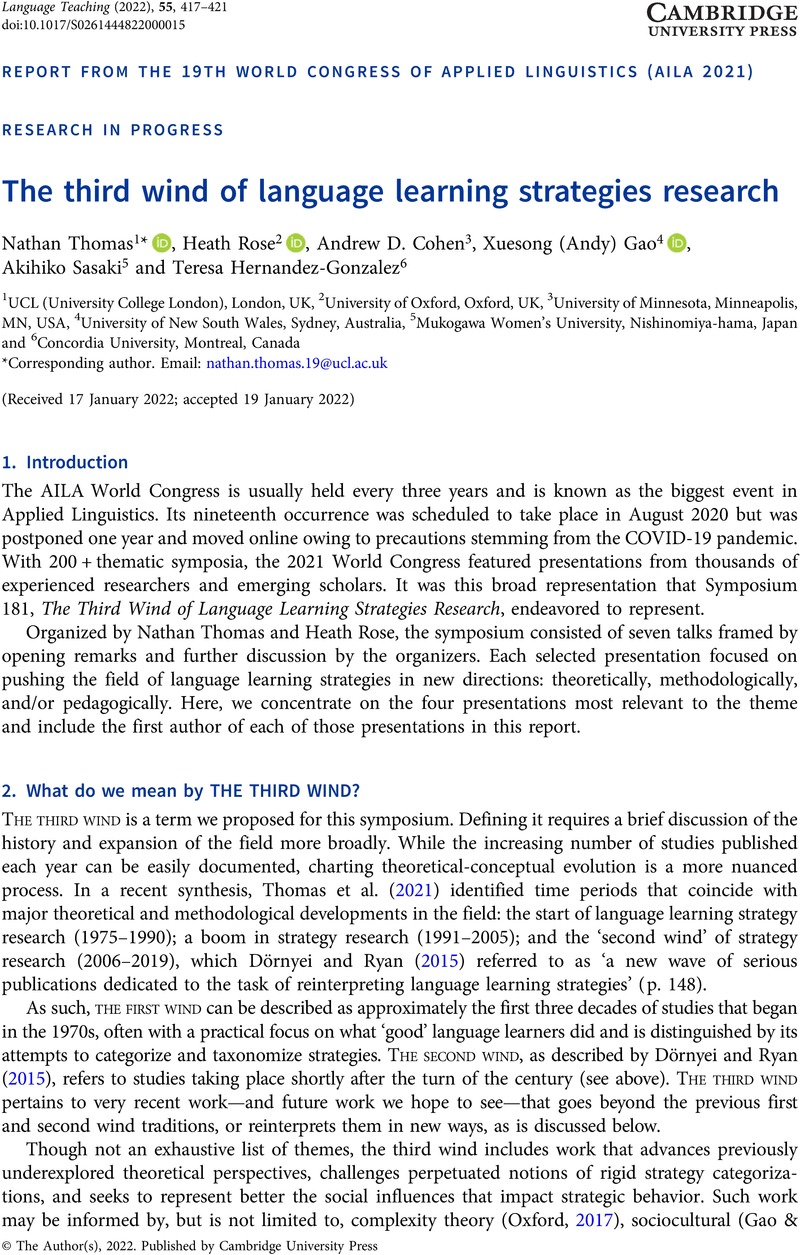Crossref Citations
This article has been cited by the following publications. This list is generated based on data provided by Crossref.
Bowen, Neil Evan Jon Anthony
and
Thomas, Nathan
2022.
Self-Regulated Learning and Knowledge Blindness: Bringing Language into View.
Applied Linguistics,
Vol. 43,
Issue. 6,
p.
1207.
Habók, Anita
Magyar, Andrea
and
Molnár, Gyöngyvér
2022.
English as a foreign language learners’ strategy awareness across proficiency levels from the perspective of self-regulated learning metafactors.
Frontiers in Psychology,
Vol. 13,
Issue. ,
Gao, Xuesong (Andy)
and
Yang, Weijia
2023.
Multilingualism and language teacher education.
System,
Vol. 118,
Issue. ,
p.
103127.
Przybył, Jakub
and
Pawlak, Mirosław
2023.
Personality as a Factor Affecting the Use of Language Learning Strategies.
p.
147.
Przybył, Jakub
and
Pawlak, Mirosław
2023.
Personality as a Factor Affecting the Use of Language Learning Strategies.
p.
45.
Hajar, Anas
Batyrkhanova, Gulmira
and
Manan, Syed Abdul
2024.
Understanding challenges, investment, and strategic language use of postgraduate students in an English-medium university in Kazakhstan.
Asian Englishes,
Vol. 26,
Issue. 1,
p.
216.
Arum, Nuranindia Endah
2024.
Adult migrants’ Norwegian language learning investment strategies in the workplace.
AILA Review,
Vol. 37,
Issue. 2,
p.
290.
Hajar, Anas
2024.
Understanding secondary school students’ challenges, language learning strategies and future selves at highly selective
EMI schools in Kazakhstan.
AILA Review,
Vol. 37,
Issue. 2,
p.
309.
Thomas, Nathan
Schneider, Jason
and
Zhou, Sihan
2024.
Qualitative research on language learning strategies and self-regulation.
AILA Review,
Vol. 37,
Issue. 2,
p.
177.
Zhang, Qi
Osborne, Caitríona
and
Lin, Xu
2024.
Translanguaging learning strategies (TLS).
Chinese Language and Discourse. An International and Interdisciplinary Journal,
Vol. 15,
Issue. 2,
p.
218.
Compagnoni, Ilaria
and
Fazzi, Fabiana
2024.
Extremely virtual and incredibly physical.
AILA Review,
Vol. 37,
Issue. 2,
p.
360.
Yuasa, Mariko
and
Takeuchi, Osamu
2024.
Strategic use of machine translation.
AILA Review,
Vol. 37,
Issue. 2,
p.
215.
Fung, Daniel
2024.
Listening strategy instruction for EMI learners to understand teacher input in science classrooms.
AILA Review,
Vol. 37,
Issue. 2,
p.
266.
Alamer, Abdullah
Teng, Mark Feng
and
Mizumoto, Atsushi
2024.
Revisiting the Construct Validity of Self-Regulating Capacity in Vocabulary Learning Scale: The Confirmatory Composite Analysis (CCA) Approach.
Applied Linguistics,
Zhou, Sihan
and
Thomas, Nathan
2025.
To survive or to thrive? Synthesizing the narrative trajectories of students’ self-regulated listening practice in an EMI transnational higher education context.
Language and Education,
Vol. 39,
Issue. 1,
p.
270.
Schneider, Jason C.
2025.
International Student Mobility in Higher Education.
p.
1.
Hajar, Anas
and
Karakus, Mehmet
2025.
Five decades of language learning strategy research: a bibliometric review and research agenda.
The Language Learning Journal,
Vol. 53,
Issue. 2,
p.
220.




